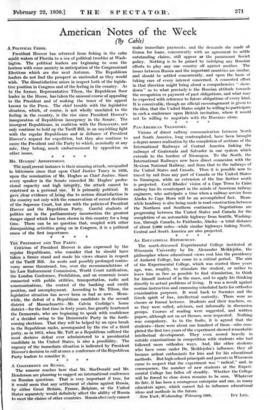* * * *
AN EDUCATIONAL EXPERIMENT.
The much-discussed Experimental College instituted at Wisconsin University by Dr. Alexander Meiklejohn, the philosopher whose educational views cost him the presidency of Amherst College, has come to a critical period. The aim of the Experimental College, which was started three years ago, was, roughly, to stimulate the student, or rather to leave him as free as possible to find stimulation, to think for himself instead of in the mass, and to apply his thinking directly to actual problems of living. It was a revolt against routine instruction and cramming scheduled facts for orthodox examination purposes. It went back to Socrates and the Greek spirit of free, intellectual curiosity. There were no classes or formal lectures. Students and their teachers, or, as they were called, advisors, met informally in discussion groups. Courses of reading were suggested, and written papers, although not on set themes, were requested. Nothing was compulsory. As to the fruits, it is agreed that the students—there were about one hundred of them—who com- pleted the first two years of the experiment showed remarkable intellectual development. They even scored heavily in outside examinations in competition with students who had followed more orthodox ways. And, like other students who have come under Dr. Meiklejohn's influence, they all became ardent enthusiastii for him and for his educational methods. But high-school principals and parents in Wisconsin came to suspect that the experiment was " radical," and, in consequence, the number of new students at the Experi- mental College has fallen off steadily. Whether the College will be forced to close down remains to be seen. Whatever its fate, it has been a courageous enterprise and one, as many educators agree, which cannot fail to influence educational ideas and methods in the future.
-New York, Wednesday,' February 19th. IVY LEE.










































 Previous page
Previous page